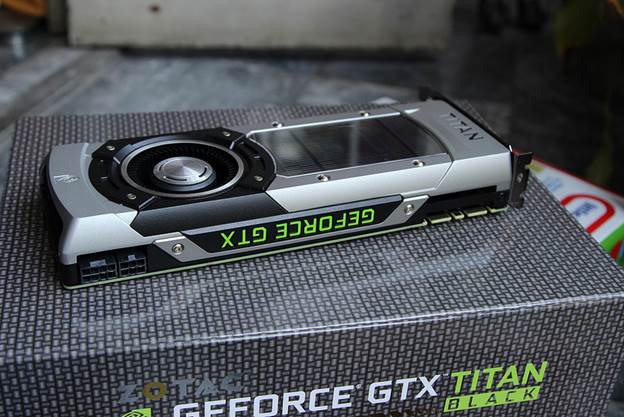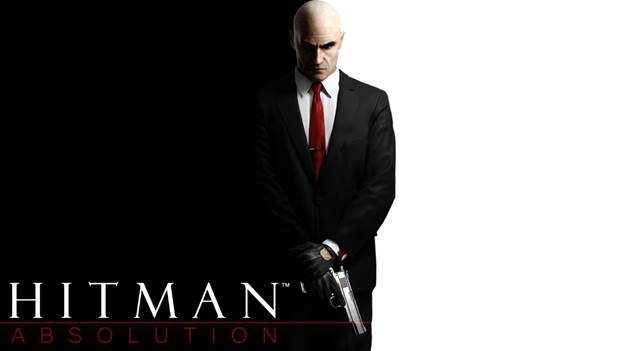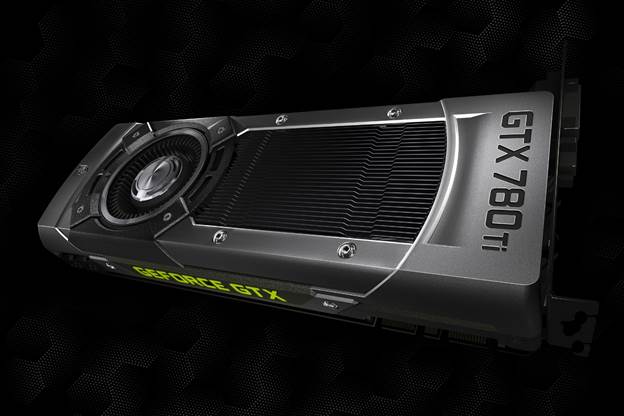Show Me The Money
Given the specifications and price, it'd be easy to assume
that the Titan Black is the fastest gaming product ever released by NVIDIA.
However, that assumption would be incorrect, as it's basically the same speed
as a GeForce GTX 780 Ti when it comes to cranking through games. The two major
differences between these products - double the memory and double precision for
compute performance on the Titan Black - have basically no impact on gaming.
Despite what AMD would have you believe, there are barely any games that use
three Gigabytes of memory, let alone six. It might make a difference if you're
going to game at 4K resolution, but the Titan Black still doesn't have the
grunt to deliver playable performances at that resolution, so it's a moot
point.

Initially, all
GeForce GTX 780 Ti GPUs will feature NVIDIA's
award-winning exterior design, pioneered by the GeForce GTX TITAN
About the only thing that will give the Titan Black a leg-up
in gaming is the slight frequency boost of the GPU (which is increased even
further thanks to Gigabyte's factory OC), but even that isn't guaranteed.
NVIDIA's Boost 2.0 technology means the GPU dynamically increases its speed anyway,
with our review sample humming at 1130MHz, just 80MHz more than our reference
GTX 780 Ti under load. Knowing this, let's take a look at some of PCPP’s usual
benchmarks to see what this $1500 card delivers.

Hitman: Absolution
follows the Original Assassin undertaking his most personal contract to date
First off the hard drive was our trusty Hitman Absolution
test. This recently received a nice 16% performance boost courtesy of NVIDIA's
334.89 drivers, but you can see that the Titan Black doesn't have a huge lead
over the 780 Ti. Ditto with the incredibly demanding Metro Last Light
benchmark, which proves that even the Titan Black doesn't have the guts to run
this game on maximum detail; you'll need a dual GPU rig for that. We cranked
the SuperSampling Anti-Aliasing up to 4X in Tomb Raider to put both cards under
extreme pressure, where the Titan Black managed to have a minor lead. Finally,
Battlefield 3 was the last benchmark to show that the Titan Black is overkill
for gamers.
As expected, overclocking performance was nearly identical
to the GTX 780 Ti, with the Titan Black reaching a maximum stable GPU speed of
1150MHz, while the memory topped out at just 1.8GHz (7.2GHz effective), an
insignificant jump. NVIDIA's reference cooler did a fantastic job of keeping
the card cool yet quiet, with our sound meter measuring just 48dB under load.

The GeForce GTX
780 Ti: The Best Gaming GPU on the Planet
Here We Go Again
NVIDIA has finally delivered the GK110 GPU in all of its
blazing glory, but we can't help feel that it’s too little, too late. Yes, it
is the fastest single-GPU graphics card on the market, but only by around five
to ten percent; non-overclocked models will have an even smaller leg-up.
Considering gamers can get basically the same performance at just over half the
price in the form of a GTX 780 Ti, the Titan Black is only worth considering
for those who need their gaming graphics card to perform double duty as a
compute workhorse. Given this is the fourth iteration of the GK110 in just over
a year, we hope this GPU-go-round doesn't become a recurring theme for NVIDIA,
as early adopters will soon learn to wait.